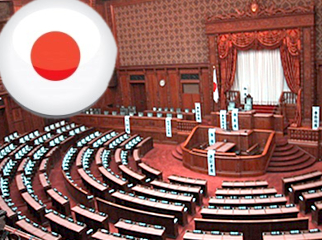 Japan’s interminable quest to pass casino legislation paused late last year for the country’s general election, which the Liberal Democratic Party (LDP) won a landslide, unseating the incumbent Democratic Party of Japan (DPJ), while the new Reformation Party finished third. Sakihito Ozawa, a former DPJ member who switched to the Reformation side ahead of the election, is a key member of the IR Giren, a cross-party committee studying the possible introduction of casinos in Japan. But the IR Giren hasn’t had a single meeting since parliament reconvened in January, in part because its former chairman failed to win re-election to the Diet in December.
Japan’s interminable quest to pass casino legislation paused late last year for the country’s general election, which the Liberal Democratic Party (LDP) won a landslide, unseating the incumbent Democratic Party of Japan (DPJ), while the new Reformation Party finished third. Sakihito Ozawa, a former DPJ member who switched to the Reformation side ahead of the election, is a key member of the IR Giren, a cross-party committee studying the possible introduction of casinos in Japan. But the IR Giren hasn’t had a single meeting since parliament reconvened in January, in part because its former chairman failed to win re-election to the Diet in December.
Last month, impatient Reformation members decided to form their own casino committee, and named Ozawa as its chairman. Ozawa told GamblingCompliance that Reformation could act as the “engine” to “move the bill to be submitted to the parliament.” Ozawa insisted it was still possible that the bill would be a multi-party approach and that Reformation “wouldn’t act on something like that alone without consulting [the other parties].” No matter which path the bill takes to get to parliament, Ozawa doesn’t anticipate it being submitted before “mid- to late-April.” The current legislative session ends in June.
PACHINKO PARLORS LOOK ABROAD TO KEEP BALLS BOUNCING
Despite the absence of casino competition, Japan’s pachinko parlors have seen revenue decline for eight consecutive years, largely the result of government intervention. In 2007, Japan’s government imposed strict regulations on machines that encouraged players to play more, and advertisements that promoted ‘the spirit of gambling’ were banned in 2011. Since 1995, both pachinko parlor revenue and the number of parlors themselves have shrunk by 30%.
Salvation may lie across the sea. The Asahi Shimbun reported that Japanese pachinko parlors are increasingly promoting their wares to South Korean tourists. In 2006, South Korea ordered the closure of its 15k domestic pachinko parlors after several highly publicized incidents, including the suicide of a heavily indebted pachinko player and a college student who wracked up a hefty debt using his parents’ credit cards. A pachinko industry newsletter recently encouraged parlors to “make pachinko into a tourism resource” and a Tokyo ad agency launched a pachinko-promoting website that gets 70% of its visits from South Korea and China. The ad agency president said it was time “we turn our serious attention to foreign tourists to underpin the industry.”
FOOTBALL BETTING LAW REVAMP COMING
For those who find pachinko unsatisfying, the LDP has promised to introduce legislation that would allow Japanese punters greater freedom to wager on football matches. As it stands, Japan only allows football betting via the Toto lottery, which offers hybrid lottery/parlay bets on Japanese ‘J-League’ footie matches. Punters aren’t permitted to wager on the outcomes of single matches. While the proposed amendment to the Soccer Betting Lottery Law hasn’t yet been made public, DLA Piper reports that it would add UK Premier League and FIFA World Cup matches to the list of betting options. The maximum payout to winners would increase from ¥100m (US$1.1m) to ¥250m ($2.7m). Japan hopes to host the 2020 Olympic games and any extra funds generated by the expanded Toto lottery would go toward renovating the National Stadium of Japan.
